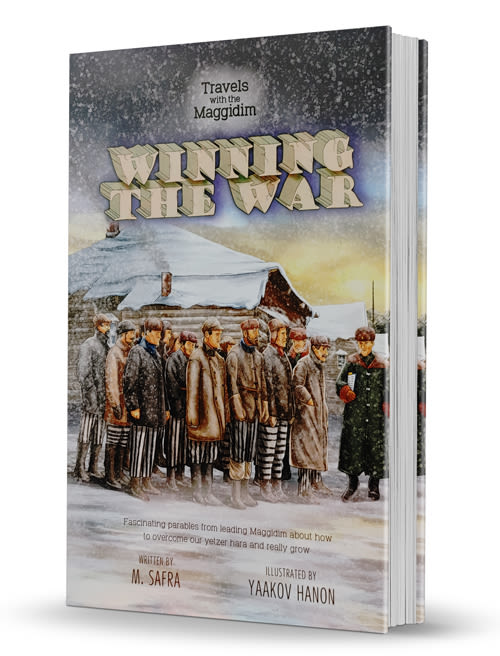
What is True Courage?
Someone with a strong heart does not fear anyone or anything.He can overcome obstacles and throw himself into the wildest...

Someone with a strong heart does not fear anyone or anything. He can overcome obstacles and throw himself into the wildest battles and the craziest adventures.
Someone with a strong heart does not fear anyone or anything. He can overcome obstacles and throw himself into the wildest battles and the craziest adventures.
“Rebbe Yehudah ben Teima said: ‘Be bold as a leopard, light as an eagle, swift as a deer, strong as a lion to do the will of your Father in Heaven.’ He would say: ‘The brazen-faced goes to Gehinnom, but the shamefaced goes to the Garden of Eden’” (Pirkei Avos 5:23).
This appears to be a contradiction. On one hand, we want to be strong and bold, implying that these are crucial middot — character traits. On the other hand, a brazen man full of chutzpah is doomed to Gehinnom.
There are two types of brazenness – chutzpah. To understand the difference, we must understand the definition of strength, since chutzpah is derived from strength.
Some people think that strength means being physically strong. Others think that strength means controlling our physical urges.
The Mishnah in Pirkei Avot asks, “Who is the strong man?” Rabbeinu Yona comments: “Strength cannot be referring to physical powers, since animals have even greater physical powers than man. True strength is courage of the heart, which consists of two parts: physical courage and controlling physical urges and desires.”
An example of physical courage would be a soldier storming an enemy position. He is considered courageous because he succeeds in overcoming his fear of enemy fire.
On the other hand, have you ever thought about how much strength is needed to subdue the yetzer hara — the evil inclination? It cleverly entices us every moment of the day. We need tremendous courage and strength to win the battle against our own yetzer hara.
Have you ever tried to stop yourself from winning an argument with a poisonous comment? It takes tremendous spiritual powers to let our opponent save face when we could easily humiliate him. It takes tremendous courage to overcome a desire for revenge. If we succeed, we’re victorious soldiers returning from a battle with the yetzer hara.
Rabbi Bachaya Ibn Pakuda in his classic book Chovot HaLevavot, Duties of the Heart, writes of a chassid who met a group of soldiers returning with the spoils of war. The chassid said to them, “You’re returning from a small battle. Now you must prepare for the great battle.”
The surprised soldiers asked, “What ‘small’ battle are you talking about? We’re returning from the Great War. What war could be more difficult than that?”
“The war against the yetzer hara,” he answered. “You won a military battle. But you'll need even more courage to vanquish the yetzer hara and receive a Heavenly reward.”
True courage is not refraining from something we find distasteful; it's precisely when we have a burning desire for something prohibited and stop ourselves from giving into that desire that we demonstrate real courage. The greater our desire for the forbidden fruit, the greater the strength and courage we need to overcome it. It takes self-sacrifice and strength to control ourselves, but in the end we gain the inner spiritual strength that is true courage.
This is the type of courage demonstrated by the Maccabees who were privileged to purify the Beit HaMikdash.
The Chanukah story, which has become the symbol of courage for generations, is not just the story of a few unequipped soldiers fighting the military superpower of the day, a global empire with a huge army and munitions. It’s also a story of inner courage.
The Greeks outlawed brit mila (circumcision), Shabbat, sanctifying Rosh Chodesh (the first of the Jewish month) and learning Torah. Their purpose was clear — they wanted to force the Jewish people to abandon Torah and become a nation like all the others. Violating this decree was punishable with death.
The Maccabees were prepared to sacrifice their lives rather than transgress the Torah. They demonstrated awesome spiritual courage in keeping the mitzvot, and because of that spiritual courage God performed miracles on their behalf. The many were delivered into the hands of the few, the mighty forces into the hands of the mighty of spirit!
This is holy chutzpah! How could a few untrained, unequipped Maccabees challenge the mightiest army on the earth? With chutzpah! But not just any chutzpah – holy chutzpah that comes from the desire to sanctify the Name of Heaven.
Rebbe Nachman of Breslev said:
“When a person begins Avodat Hashem, Divine service, it seems that he has a long way to go, and it appears that Heaven is distancing him, and he isn’t being allowed to begin Avodat Hashem. But the distancing is to bring him closer. He needs great strengthening so that he shouldn’t become depressed, God forbid, even if he sees that it takes him years of great effort in Avodat Hashem, and he still remains distant. Everything depends on never becoming depressed, no matter what happens.
“When he wants to come close to God and repent, he must overcome thousands of downfalls, and he needs to be very strong and strengthen his heart each time, never giving up because of any downfall, no matter what will be. The main thing is that everything depends on never becoming depressed and to continue strengthening himself…” (Likutey Moharan II:48).
We need holy chutzpah to carry on despite our spiritual downfalls. We must remind ourselves, “Even if I did something wrong, I can continue to be strong and to have courage; I won’t allow the yetzer hara to overwhelm me and distance me from the Almighty. On the contrary, I will become closer to God and continue to strengthen myself. I will discover the good points within myself and use them to grow.”
Rebbe Nachman concludes:
“When a person has holy chutzpah, he is giving strength and power to Heaven (as if it could be), as in the verse: ‘Give strength to God.’ This strengthens the Heavenly aspect of holiness, which in turn influences us, as it’s written: ‘He gives strength and might to the nation’ – God influences us with holy chutzpah and gives us the strength and might to withstand the chutzpah of the negative influences, and the chutzpah of the generation – all the obstacles in the spiritual and material realms. Without holy chutzpah, these obstacles prevent us from learning Torah and becoming close to God. A person must know when to act with chutzpah, so that he won't be brazen-faced, God forbid, which is a very bad character trait. But a man must have holy chutzpah” (Likutey Moharan, 1:147).
“Rebbe Yehudah ben Teima said: ‘Be bold as a leopard … to do the will of your Father in Heaven.’” We need holy chutzpah to grow spiritually. We need to ask the Almighty to help us remain strong in the face of this generation's chutzpah, so that we may continue to serve God in holiness, and yes, with chutzpah – holy chutzpah!







Tell us what you think!
Thank you for your comment!
It will be published after approval by the Editor.